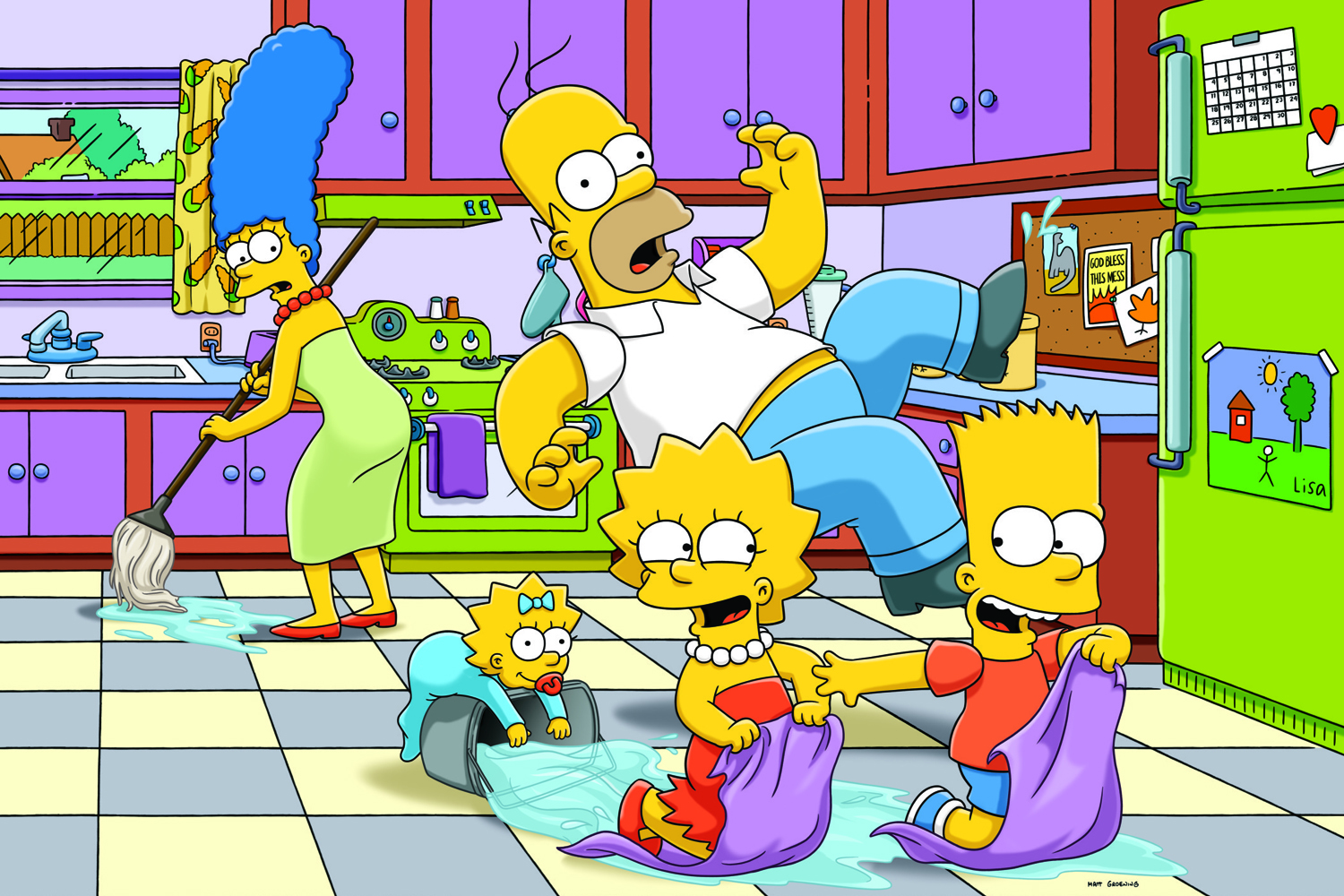
You are getting a free preview of a TIME Magazine article from our archive. Many of our articles are reserved for subscribers only. Want access to more subscriber-only content? Click here.
Ten reasons the Simpsons are America’s ideal family:
1) They stick with one another through thin and thin. Father Homer, mother Marge, 10-year-old Bart, eight-year-old Lisa and baby Maggie seem to be a typical sitcom family — the Honeymooners with kids, the Flintstones in suburbia — with typically outlandish dilemmas to face and resolve each week. But there the similarity ends. Since it sprang in 1990 from cartoon spots on The Tracey Ullman Show, The Simpsons has proved uniquely dense and witty. And thanks to top writers, directors and actors in the care of creator Matt Groening and comedy veteran Jim Brooks, it has stayed that way. As it celebrates its 100th episode this week — “That’s 800 episodes in sitcom years,” says Groening of the six months’ production time for each show — The Simpsons can celebrate more: its status as TV’s most satisfying program.
2) For a family of underachievers, the Simpsons have achieved quite a bit. In the show, Homer has been a monorail conductor and a baseball mascot; he won a Grammy (for Outstanding Soul, Spoken Word or Barbershop Album) and survived eating a deadly blowfish. Marge sang Blanche Dubois in the musical O Streetcar! Lisa created her own talking doll, mastered the saxophone and the Talmud, was a Junior Miss Springfield, uncovered political corruption and saved the Republic. Bart adopted an elephant, fell down a well and was rescued by Sting, and was tried for murdering Principal Skinner. Maggie had her first word voiced for her by Elizabeth Taylor.
3) There is life beyond Bart. The scamp was the show’s first star; his ripostes (“Eat my shorts”) became T-shirt slogans. Bart is still the richest Simpsons character, but the purview has expanded to include all of Springfield, with 50 or so comic figures, from the Kwik-E-Mart’s Apu Nahasapeemapetilan to the Kennedyesque Mayor Quimby to Krusty the Clown and his sadistic cartoon cohorts Itchy & Scratchy — a wonderfully congested cosmos each week.
4) Homer isn’t bright, but he loves his brood. The poor patriarch is so dull witted that he probably couldn’t count to 16 if he used all his fingers and his toes. But he is a faithful husband, and if he often derides his kids, he will do anything — go skateboarding off a cliff, defy his boss, buy Lisa a pony — if the tots scream loud enough and if Marge gives him a lecture.
5) They have famous friends. Guest voices on the show have included Bob Hope, Michelle Pfeiffer, Ringo Starr, Johnny Carson, Darryl Strawberry, Aerosmith, Bette Midler, Michael Jackson and Dustin Hoffman. “For some reason,” says Groening, “a lot of Hollywood big shots are curious to see how they’d be drawn with bulging eyes and no chin.”
6) They are excellent role models. True story: a few years ago, a 10-year- old successfully performed the Heimlich maneuver on his choking brother after seeing it illustrated on The Simpsons
7) They’re smart. Well, anyway, their writers are. “There are jokes you won’t get,” says Groening, “unless you’ve actually attended a few classes in college.” Lit. 101 will teach you that Lisa’s poetry is inspired by Allen Ginsberg’s and that the prison number (24601) worn variously by Marge, Principal Skinner and Sideshow Bob is Jean Valjean’s in Les Miserables. It also helps if you know old movies. Simpsons plots have plundered King Kong, Citizen Kane, Thelma & Louise, Cape Fear and the entire Hitchcock oeuvre. “If you steal from a black-and-white film,” Brooks told the writers, “it’s an homage.”
8) They’re reliable. “Animated characters don’t get busted,” says Groening, “and they don’t get old.” Maggie has not aged a day. Homer can’t get much fatter or balder. Marge’s bouffant will always look like a neatly trimmed blue fir. Bart frets about graduating from fourth grade, but fate and good ratings will keep him there for life. Lisa, the poor stranded sensitive intellectual, will never escape Springfield.
9) After all these years, they can still surprise you. Part of the fun of watching is trying to figure out what the main plot line will be; the first few minutes of any episode are so packed with comic detail that the story could go in any of a dozen directions. This is one show whose writers seem to have too many good ideas.
10) They have heart. One of Brooks’ cardinal rules: Let’s not be afraid of emotion. The strongest episodes are those (like “Lisa’s Substitute,” “Homer Alone,” “Like Father, Like Clown” and “Bart the Lover”) that reveal the bedrock fondness, desperation and loyalty that bond this or any other frazzled clan. A viewer can feel awe at the show’s cascading wit and still purr at the sweet, deep sentiment.
Hail, Simpsons! May you live another 100 episodes at the same apex of quality.
More Must-Reads from TIME
- Cybersecurity Experts Are Sounding the Alarm on DOGE
- Meet the 2025 Women of the Year
- The Harsh Truth About Disability Inclusion
- Why Do More Young Adults Have Cancer?
- Colman Domingo Leads With Radical Love
- How to Get Better at Doing Things Alone
- Michelle Zauner Stares Down the Darkness
Contact us at letters@time.com